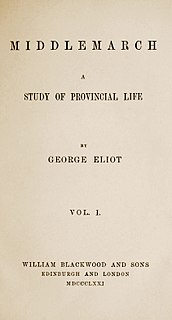Middlemarch is a novel by George Eliot.
Middlemarch may also refer to:
Clone or Clones or Cloning or Cloned or The Clone may refer to:
Play School or Playschool may refer to:

Middlemarch, A Study of Provincial Life is a novel by the English author Mary Anne Evans, who wrote as George Eliot. It first appeared in eight instalments (volumes) in 1871 and 1872. Set in Middlemarch, a fictional English Midland town, in 1829 to 1832, it follows distinct, intersecting stories with many characters. Issues include the status of women, the nature of marriage, idealism, self-interest, religion, hypocrisy, political reform, and education. Despite comic elements, Middlemarch uses realism to encompass historical events: the 1832 Reform Act, early railways, and the accession of King William IV. It looks at medicine of the time and reactionary views in a settled community facing unwelcome change. Eliot began writing the two pieces that formed the novel in 1869–1870 and completed it in 1871. Initial reviews were mixed, but it is now seen widely as her best work and one of the great English novels.

Timothy Sydney Robert Hardy was an English actor who had a long career in theatre, film and television. He began his career as a classical actor and later earned widespread recognition for roles such as Siegfried Farnon in the BBC television series All Creatures Great and Small, Cornelius Fudge in the Harry Potter film series and Winston Churchill in several productions, beginning with the Southern Television series Winston Churchill: The Wilderness Years. He was nominated for the BAFTA for Best Actor for All Creatures Great and Small in 1980 and Winston Churchill: The Wilderness Years in 1982. Aside from acting, Hardy was an acknowledged expert on the medieval English longbow and wrote two books on the subject.
Today may refer to:
Industry may refer to:

Andrew Wynford Davies is a Welsh writer of screenplays and novels, best known for House of Cards and A Very Peculiar Practice, and his adaptations of Vanity Fair, Pride and Prejudice, Middlemarch, Bleak House and War & Peace. He was made a BAFTA Fellow in 2002.
Private or privates may refer to:

Rufus Frederik Sewell is an English film and stage actor. In film, he has appeared in Carrington (1995), Hamlet (1996), Dangerous Beauty (1998), Dark City (1998), A Knight's Tale (2001), The Legend of Zorro (2005),The Illusionist (2006), Amazing Grace (2006), The Holiday (2006), Paris, je t'aime (2006), Judy (2019), The Father (2020), and Old (2021).
A chef is a person who cooks professionally.
Bulstrode may refer to:
Vanity Fair may refer to:
Juliet Emma Aubrey is a British actress of theatre, film, and television. She won the 1995 BAFTA TV Award for Best Actress for playing Dorothea in the BBC serial Middlemarch (1994). She is also known for her role as Helen Cutter in the ITV series Primeval (2007–2011). Her film appearances include Still Crazy (1998), The Constant Gardener (2005) and The Infiltrator (2016).
Pinocchio is the boy-puppet from the 1883 novel The Adventures of Pinocchio by Italian author Carlo Collodi.
Harbour Lights or Harbor Lights may refer to:
Sherlock Holmes is a character created by Sir Arthur Conan Doyle.

Middlemarch is a 1994 television adaptation of the 1871 novel of the same name by George Eliot. Produced by the BBC on BBC2 in six episodes, it is the second such adaptation for television of the novel. It was directed by Anthony Page from a screenplay by Andrew Davies, and starred Juliet Aubrey, Rufus Sewell, Douglas Hodge and Patrick Malahide.
Anthony Page is a British stage and film director.
The Diary of Anne Frank – alternative title The Diary of a Young Girl – is the English translation of the Dutch book Het Achterhuis.
A detective is a professional investigator.